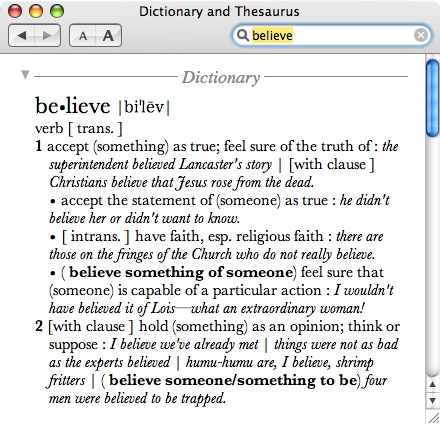Has Faith: John 3:16 in the NEB/REB--Good Translation or Not?
“For God so loved the world, that he gave his only begotten Son, that whosoever believeth in him should not perish, but have everlasting life.” (John 3:16 KJV)
Yet the NEB (1961/70) translators were bold enough to make a few minor changes and one significant change in John 3:16, only to have all but one of them removed in the more conservative REB of 1989.
"God loved the world so much that he gave his only Son, that everyone who has faith in him may not die but have eternal life." (John 3:16 NEB)
“God so loved the world that he gave his only Son, that everyone who has faith in him may not perish but have eternal life.” (John 3:16 REB)
Neither "God loved the world so much" (NEB) or "God so loved the world" (REB, also KJV) reflects the meaning of John's Greek here. A much better, but certainly less traditional reading is found in the HCSB: "For God loved the world in this way" or in the NET Bible: "For this is the way God loved the world:" (for a discussion of why these renderings are more accurate, see my review of the HCSB).
But that's not the focus of this post. Rather, I want to call attention to the NEB/REB's use of "has faith" instead of the traditional "believe."
When I first got a copy of the REB, hot off the presses in 1989, the peculiar rendering of has faith got my attention in my initial examination of this version of the Bible. I did not yet have a copy of the NEB, so I did not know that this particular phrase was handed down from its predecessor. I was in college at the time, and I had a couple of significant influences in my life--mentors, if you will. In discussing the REB with one of these individuals, I pointed out the interesting phrasing of John 3:16 to him. He told me he wasn't quite sure how accurate "has faith" was in John's gospel. He had just finished a seminar at Golden Gate Seminary on John, and one of the things pointed out in the class is that the specific word faith (πίστις/pistis) never occurs in the fourth gospel.
And that's technically true. The noun form of of the word never appears in John. But, of course, as referenced in John 3:16, the verb form (πιστεύω/pisteuo) does. In fact, πιστεύω/pisteuo occurs 98 times in John!
From the UBS Greek Dictionary, here are the two words, the noun first and then the verb (which appears in John 3:16):
πίστις, εως f faith, trust, belief; the Christian faith; conviction, good conscience (Ro 14:22,23); perhaps body of faith, doctrine (Jude 1:3,20); assurance, proof (Ac 17:31); promise (1Tm 5:12)
πιστεύω believe (in), have faith (in) (with God or Christ as object); believe, believe in; have confidence (in someone or something), entrust (something to another); ὅς μὲν π. φαγεῖν πάντα one man’s faith allows him to eat anything (Ro 14:2)
I understand why the NEB/REB translators rendered πιστεύω "has faith" instead of believe. In the Greek the relationship between the noun and verb are evident; they have the same root. But in English, there isn't a direct verb form of faith. We don't say, "I faithed in Jesus." So why not just use the traditional believe?

“You believe that there is one God. Good! Even the demons believe that—and shudder.” (James 2:19 TNIV)
Believe may simply not be an adequate word for πιστεύω in English. It's awkward, but the Amplified Bible gets the meaning across fairly well with "..so that whoever believes in (trusts in, clings to, relies on) Him shall not perish..." The parenthetical definition for believes in--"trusts in, clings to, relies on"--gets it right. But the Amplified Bible is not really suitable for any kind of use in a group setting (I don't really even recommend the Amplified Bible in general), so how can πιστεύω in John 3:16 best be rendered?
The NEB/REB may indeed have the best solution with has faith. What do you think? Is this good translation or do you think it's not allowed to use faith as a direct object in this verse since technically πίστις never occurs in John? Feel free to offer your opinion in the comments.
As an aside... Last Christmas, I went back to my home church for a worship service. I came across the same individual mentioned above who had been one of my mentors in college. He had just come from teaching a Bible study and was carrying two Bibles. He told me that he likes them both and gave up trying to choose one over the other. He carries them both to any study he leads or participates in. What were they? He was holding a TNIV Study Bible and a Cambridge text edition of the REB.
They say the apple doesn't fall far from the tree...









